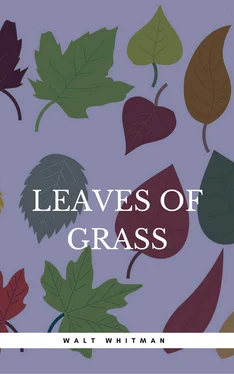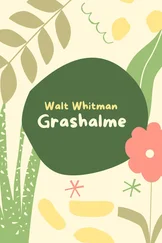Walt Whitman - Leaves of Grass
Здесь есть возможность читать онлайн «Walt Whitman - Leaves of Grass» — ознакомительный отрывок электронной книги совершенно бесплатно, а после прочтения отрывка купить полную версию. В некоторых случаях можно слушать аудио, скачать через торрент в формате fb2 и присутствует краткое содержание. ISBN: , Жанр: Языкознание, Критика, на английском языке. Описание произведения, (предисловие) а так же отзывы посетителей доступны на портале библиотеки ЛибКат.
- Название:Leaves of Grass
- Автор:
- Жанр:
- Год:неизвестен
- ISBN:9782377930524
- Рейтинг книги:4 / 5. Голосов: 1
-
Избранное:Добавить в избранное
- Отзывы:
-
Ваша оценка:
- 80
- 1
- 2
- 3
- 4
- 5
Leaves of Grass: краткое содержание, описание и аннотация
Предлагаем к чтению аннотацию, описание, краткое содержание или предисловие (зависит от того, что написал сам автор книги «Leaves of Grass»). Если вы не нашли необходимую информацию о книге — напишите в комментариях, мы постараемся отыскать её.
Leaves of Grass — читать онлайн ознакомительный отрывок
Ниже представлен текст книги, разбитый по страницам. Система сохранения места последней прочитанной страницы, позволяет с удобством читать онлайн бесплатно книгу «Leaves of Grass», без необходимости каждый раз заново искать на чём Вы остановились. Поставьте закладку, и сможете в любой момент перейти на страницу, на которой закончили чтение.
Интервал:
Закладка:
In the construction of our artificial Whitman, we began with the requirement that a certain philosopher should have been bred to the business of an auctioneer. We must add now, to complete the imitation of Walt Whitman, that the wild philosopher and poet, as conceived by us, should be perpetually haunted by the delusion that he has a catalogue to make. Three-fourths of Walt Whitman’s book is poetry as catalogues of auctioneers are poems. Whenever any general term is used, off the mind wanders on this fatal track, and an attempt is made to specify all lots included under it. Does Walt Whitman speak of a town, he is at once ready with pages of town lots. Does he mention the American country, he feels bound thereupon to draw up a list of barns, waggons, wilds, mountains, animals, trees, people, “a Hoosier, a Badger, a Buckeye, a Louisianian, or Georgian, a poke-easy from sand-hills and pines,” &c., &c. We will give an illustration of this form of lunacy. The subject from which the patient starts off is equivalent to things in general, and we can spare room only for half the catalogue. It will be enough, however, to show how there arises catalogue within catalogue, and how sorely the paroxysm is aggravated by the incidental mention of any one particular that is itself again capable of subdivision into lots.
The usual routine, the workshop, factory, yard, office, store, or desk;
The jaunt of hunting or fishing, or the life of hunting or fishing.
Pasture-life, foddering, milking and herding, and all the personnel and usages;
The plum-orchard and apple-orchard, gardening, seedlings, cuttings, flowers and vines,
Grains and manures, marl, clay, loam, the subsoil plough, the shovel and pick and rake and hoe, irrigation and draining;
The currycomb, the horse-cloth, the halter and bridle and bits, the very wisps of straw,
The barn and barn-yard, the bins and mangers, the mows and racks;
Manufactures, commerce, engineering, the building of cities, and every trade carried on there, and the implements of every trade.
Now let us compare with this a real auctioneer’s catalogue. We will take that of Goldsmith’s chambers, by way of departing as little as we can from the poetical. For, as Walt Whitman would say (and here we quote quite literally, prefixing only a verse of our own, from “A Catalogue of the Household Furniture with the select collection of scarce, curious, and valuable books of Dr. Goldsmith, deceased, which, by order of the admr, will be sold by auction, &c., &c.)
Surely the house of a poet is a poem, and behold a poet in the auctioneer who tells you the whole lot of it—
The bath stone, compass front, open border, fender, shovel, tongs, and poker,
The blue moreen festoon window-curtain, the mahogany dining-table on the floor,
The six ditto hollow seat chairs covered with blue moreen,
Covered with blue moreen and finished with a double row of brass nails and check cases,
The Wilton carpet, sun shade, line and pulleys, the deal sideboard stained,
The teapot, five coffee cups, sugar basin and cover, four saucers and six cups,
Two quart decanters and stoppers, one plain ditto, eleven glasses, one wine and water glass,
A pair of bellows and a brush, a footman, copper tea-kettle and coal-scuttle.
Two pairs of plated candlesticks.
A mahogany teaboard, a pet bordered ditto, a large round japanned ditto and two waiters.
The Tragic Muse in a gold frame.
After all, we are not sure whether the poetry of that excellent Mr. Good, the auctioneer who, at his Great Room, No. 121 Fleet Street, sold the household furniture of Oliver Goldsmith in the summer of 1774, does not transcend in wisdom and in wit “the most extraordinary piece of wit and wisdom that” (according to Mr. Emerson) “America has yet contributed.”
From the London Leader
LEAVES OF GRASS. Brooklyn, New York, 1855. London: Horsell
“Latter-day poetry” in America is of a very different character from the same manifestation in the old country. Here, it is occupied for the most part with dreams of the middle ages, of the old knightly and religious times; in America it is employed chiefly with the present, except when it travels out into the undiscovered future. Here our latter-day poets are apt to whine over the times, as if heaven were perpetually betraying the earth with a show of progress that is in fact retrogression, like the backward advance of crabs; there, the minstrels of the stars and stripes blow a loud note of exultation before the grand new epoch, and think the Greeks and Romans, the early Oriental races, and the later men of the middle centuries, of small account before the onward tramping of these present generations. Of this latter sect is a certain phenomenon who has recently started up in Brooklyn, New York—one Walt Whitman, author of “ Leaves of Grass ,” who has been received by a section of his countrymen as a sort of prophet, and by Englishmen as a kind of fool. For ourselves, we are not disposed to accept him as the one, having less faith in latter-day prophets than in latter-day poets; but assuredly we cannot regard him as the other. Walt is one of the most amazing, one of the most startling, one of the most perplexing creations of the modern American mind; but he is no fool, though abundantly eccentric, nor is his book mere food for laughter, though undoubtedly containing much that may easily and fairly be turned into ridicule.
The singularity of the author’s mind—his utter disregard of ordinary forms and modes—appears in the very title-page and frontispiece of his work. Not only is there no author’s name, (which in itself would not be singular) but there is no publisher’s name—that of the English bookseller being a London addition. Fronting the title is the portrait of a bearded gentleman in his shirt-sleeves and a Spanish hat, with an all-pervading atmosphere of Yankeedoodle about him; but again there is no patronymic, and we can only infer that this roystering blade is the author of the book. Then follows a long prose treatise by way of preface (and here once more the anonymous system is carried out, the treatise having no heading whatever); and after that we have the poem, in the course of which a short autobiographical discourse reveals to us the name of the author.
A passage from the Preface, if it may be so called, will give some insight into the character and objects of the work.
Other states indicate themselves in their deputies—but the genius of the United States is not best or most in its executives or legislatures nor in its ambassadors, or authors, or colleges, or churches, or pariors, nor even in its newspapers or inventors; but always most in the common people. Their manners, speech, dress, friendships; the freshness and candor of their physiognomy, the picturesque looseness of their carriage, their deathless attachment to freedom, their aversion to any thing indecorous, or soft, or mean—the practical acknowledgment of the citizens of one state by the citizens of all other states, the fierceness of their roused resentment, their curiosity and welcome of novelty, their self-esteem and wonderful sympathy, their susceptibility to a slight, the air they have of persons who never knew how it felt to stand in the presence of superiors, the fluency of their speech, their delight in music, (the sure symptom of manly tenderness and native elegance of soul,) their good temper and open-handedness, the terrible significance of their elections, the President’s taking off his hat to them, not they to him—these too are unrhymed poetry. It awaits the gigantic and generous treatment worthy of it.
Читать дальшеИнтервал:
Закладка:
Похожие книги на «Leaves of Grass»
Представляем Вашему вниманию похожие книги на «Leaves of Grass» списком для выбора. Мы отобрали схожую по названию и смыслу литературу в надежде предоставить читателям больше вариантов отыскать новые, интересные, ещё непрочитанные произведения.
Обсуждение, отзывы о книге «Leaves of Grass» и просто собственные мнения читателей. Оставьте ваши комментарии, напишите, что Вы думаете о произведении, его смысле или главных героях. Укажите что конкретно понравилось, а что нет, и почему Вы так считаете.












